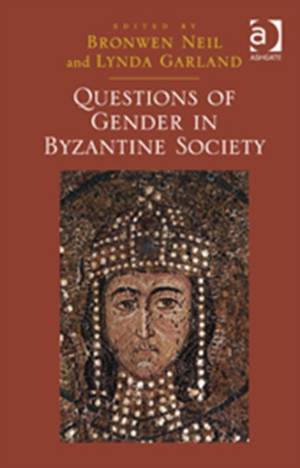
En raison d'une grêve chez bpost, votre commande pourrait être retardée. Vous avez besoin d’un livre rapidement ? Nos magasins vous accueillent à bras ouverts !
- Retrait gratuit dans votre magasin Club
- 7.000.000 titres dans notre catalogue
- Payer en toute sécurité
- Toujours un magasin près de chez vous
En raison de la grêve chez bpost, votre commande pourrait être retardée. Vous avez besoin d’un livre rapidement ? Nos magasins vous accueillent à bras ouverts !
- Retrait gratuit dans votre magasin Club
- 7.000.0000 titres dans notre catalogue
- Payer en toute sécurité
- Toujours un magasin près de chez vous
Description
Gender was a key social indicator in Byzantine society, as in many others. While studies of gender in the western medieval period have appeared regularly in the past decade, similar studies of Byzantium have lagged behind. Masculine and feminine roles were not always as clearly defined as in the West, while eunuchs made up a 'third gender' in the imperial court. Social status indicators were also in a state of flux, as much linked to patronage networks as to wealth, as the Empire came under a series of external and internal pressures. This fluidity applied equally in ecclesiastical and secular spheres. The present collection of essays uncovers gender roles in the imperial family, in monastic institutions of both genders, in the Orthodox church, and in the nascent cult of Mary in the east. It puts the spotlight on flashpoints over a millennium of Byzantine rule, from Constantine the Great to Irene and the Palaiologoi, and covers a wide geographical range, from Byzantine Italy to Syria. The introduction frames the following nine chapters against recent scholarship and considers methodological issues in the study of gender and Byzantine society. Together these essays portray a surprising range of male and female experience in various Byzantine social institutions - whether religious, military, or imperial -- over the course of more than a millennium. The collection offers a provocative contrast to recent studies based on western medieval scholarship. Common themes that bind the collection into a coherent whole include specifically Byzantine expectations of gender among the social elite; the fluidity of social and sexual identities for Byzantine men and women within the church; and the specific challenges that strong individuals posed to the traditional limitations of gender within a hierarchical society dominated by Christian orthodoxy.
Spécifications
Parties prenantes
- Auteur(s) :
- Editeur:
Contenu
- Nombre de pages :
- 232
- Langue:
- Anglais
Caractéristiques
- EAN:
- 9781409447795
- Date de parution :
- 28-08-13
- Format:
- Livre relié
- Format numérique:
- Genaaid
- Dimensions :
- 156 mm x 233 mm
- Poids :
- 589 g

Les avis
Nous publions uniquement les avis qui respectent les conditions requises. Consultez nos conditions pour les avis.






